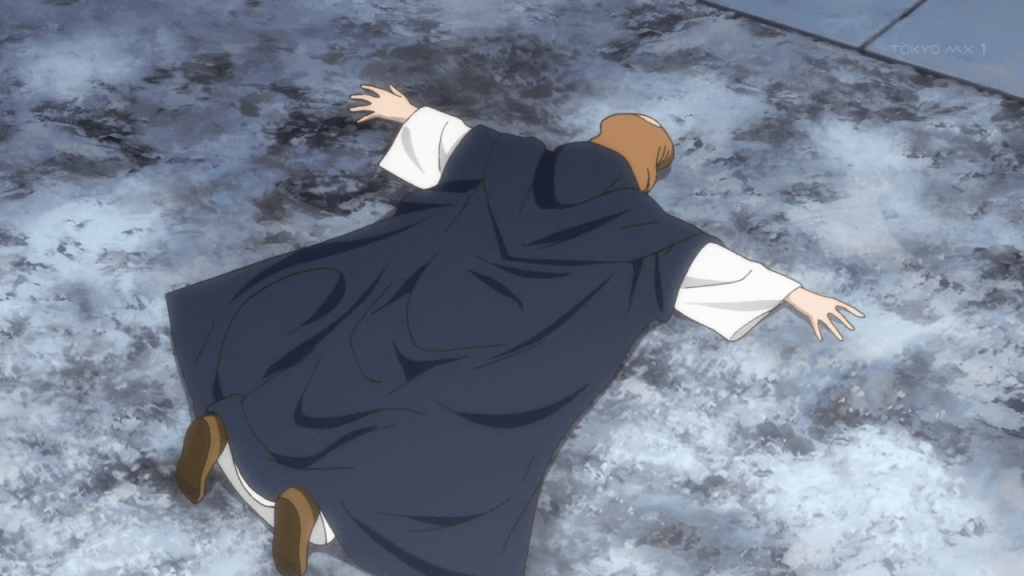This is how Rageo feels right now. Episode 10 has an insert song which is being spoken over. We’re hoping the OST on Wednesday has the song in it so we can translate it properly.
Like Maria, we’re still looking for that special someone. We’re in need of Translators and Translation checkers, Editors and Quality Checkers, Typesetters and KFXers. If any of these positions appeal to you, head over to our recruitment page to get started.
08 720p: Torrent | DDL 09 720p: Torrent | DDL
Once again the producers have been kind enough to provide some historical notes on the show’s homepage (Google translated).
Prostration: the placement of the body in a reverentially or submissively prone position as a gesture. Typically prostration is distinguished from the lesser acts of bowing or kneeling by involving a part of the body above the knee touching the ground, especially the hands.
Graoully the dragon: Clement of Metz, like many other saints, is the hero of a legend in which he is the vanquisher of a local dragon. In the legend of Saint Clement it is called the Graoully or Graouilly. The legend states that the Graoully, along with countless other snakes, inhabited the local Roman amphitheater. The snakes’ breath had so poisoned the area that the inhabitants of the town were effectively trapped in the town. After converting the local inhabitants to Christianity after they agreed to do so in return for ridding them of the dragon, Clement went into the amphitheater and quickly made the sign of the cross after the snakes attacked him. They immediately were tamed by this. Clement led the Graoully to the edge of the Seille, and ordered him to disappear into a place where there were no men or beasts. Orius did not convert to Christianity after Clement tamed the dragon. However, when the king’s daughter died, Clement brought her back from the dead, thereby resulting in the king’s conversion.
Despertar feliz: Beat it!
Bladud: Bladud was a legendary king of the Britons, for whose existence there is no historical evidence. He is first mentioned in Geoffrey of Monmouth’s Historia Regum Britanniae, which describes him as the son of King Rud Hud Hudibras, and the tenth ruler in line from the first King, Brutus.
Rud Hud Hudibras: was a legendary king of the Britons as recounted by Geoffrey of Monmouth. He was the son of King Leil and ruled during a civil war. During the waning years of Leil’s reign, the kingdom of the Britons became unstable, and civil war broke out. Rud Hud Hudibras became king after his father’s death and reigned for 39 years, ending the civil war and restoring peace to the kingdom. During his reign, he founded Kaerreint, later renamed Canterbury by the Angles. He is also said to have founded Kaerguenit (Winchester) and Paladur Castle (Shaftesbury).
Trinovantum: In medieval British legend, is the name mythically given to London in earliest times. According to Geoffrey of Monmouth’s Historia Regum Britanniae (1136) it was founded by the exiled Trojan Brutus, who called it Troia Nova (“New Troy”), which was gradually corrupted to Trinovantum.
Saint Thomas Aquinas’ Five Proofs of God: God is a provable thing. You heretics better remember that.
Pelagius’ doctrine of free will: The view that mankind can avoid sinning, and that we can freely choose to obey God’s commandments, stand at the core of Pelagian teaching. Pelagius stressed human autonomy and freedom of the will.
Kissing of the feet in Christianity: This caring act “reflects the grace of God’s never-ending, unconditional love and, as such, its observance is surely a means of grace with exceedingly strong sacramental characteristics.”
